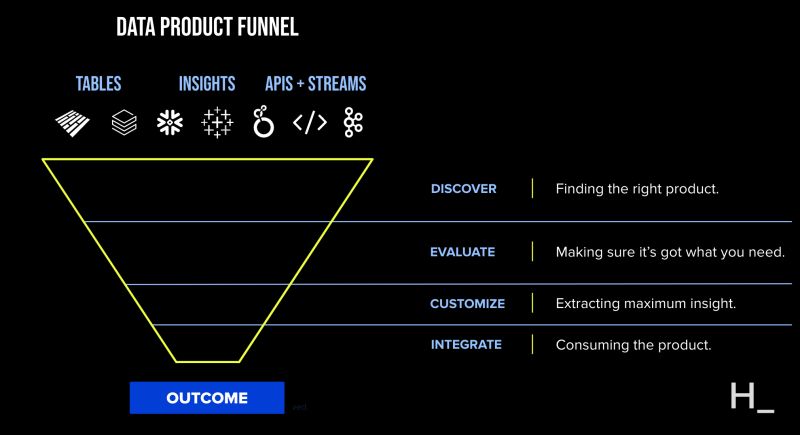Taking a data product to market presents a unique set of challenges. My colleagues and I have found it helpful to think about this process from a data consumer’s perspective. That is, we think about how the user experience can be improved across the main pillars of working with data products: discovery, evaluation, customization, and integration. I like to call this the data product funnel. In this blog, I’ll focus primarily on the middle two steps, evaluation and customization.


First and foremost, it’s important to recognize that data products extend well beyond the traditional rows and columns in a table. Whether it’s visualizations, insights, models, APIs, streams, or full-blown data apps, there’s a wide spectrum of ways data can be productized. As a result, the user experience needs to reflect and accommodate this variety.
When taking a data product to market, a common goal is to drive scalable consumption. An intuitive, self-service experience is crucial to lowering the operational burden on your team and giving your consumers the tools they need to discover the right data products. By making it easy for customers to find and use your product, you can reduce friction and increase adoption.
Make your data products easier to evaluate
People use data products to help them solve problems. So it naturally follows that you’ll need to assess and evaluate a data product before you can start using it in earnest. In other words, they need to know what’s inside the box before committing to purchasing it. That’s why, from a data consumer perspective, evaluating a data product needs to be as simple and practical as possible.
This can be a challenging process, as there is often a sense of anxiety from data producers around sharing valuable data and insights without strict commercial agreements in place. Therefore, it’s important to create a system that is transparent, secure, and easy to use so that both sides can feel confident in the evaluation process. By doing so, you can ensure that opportunities aren’t missed due to difficulties in the evaluation stage.
A great real world example of this is CoreLogic’s Discovery Platform. Their customers are looking for valuable insights which drive decision making, so getting the right data product is vital. On the Discovery Platform, users are encouraged to “try before they buy” to ensure a satisfying fit between data product and use case. These data product evaluations happen in a secure cloud sandbox, where users can use industry-standard tooling to play around with the data to make sure it’s fit for purpose.
Customizing the experience
Customization is often the key to realizing value from a data product. In many cases, the most valuable insights come from refining the data down to a smaller, more targeted set of information that can be easily consumed, manipulated, and analyzed. By enabling data consumers to customize the product to their specific needs, you can increase the relevance and value of the data.
It’s also important to recognize that customers will work across a wide range of technology stacks and have varying levels of skills and capabilities. This means that it’s crucial to make it easy for them to operationalize your product. From my experience, for every $1 that data costs, it takes $8 to operationalize. By driving this cost down, you can make your product more accessible to a wider range of consumers.
Don’t forget about product management
Finally, it always comes down to good old product management. You need to make sure you’re solving a market problem that’s big enough to warrant the investment into productizing the data in the first place. Ultimately, the goal is to help data consumers achieve their desired outcomes and realize the value your data can bring. By staying relentlessly focused on this goal, you can ensure that your data product has every chance of success in the market.
In conclusion, taking a data product to market requires a different set of considerations than traditional products. By adapting the traditional marketing funnel and focusing on the data consumer experience of discovery, evaluation, customization, and integration — oh, and don’t forget product management! — we can increase the chances of success. The potential value of data products is enormous, and by getting it right, we can unlock that value for ourselves and our customers.


If you'd like to discuss go-to-market ideas for your data products, get in touch.




